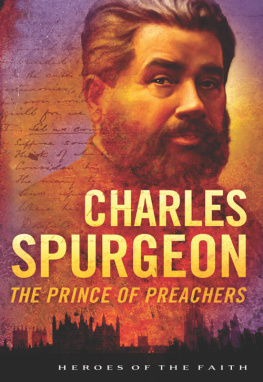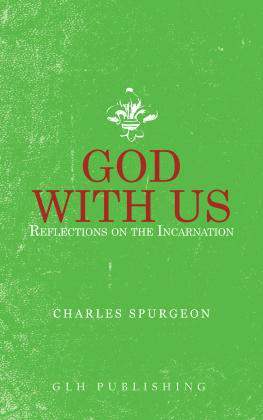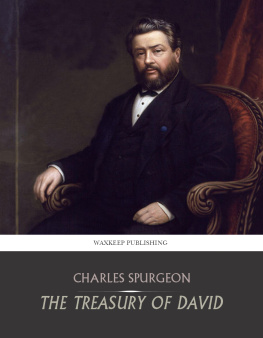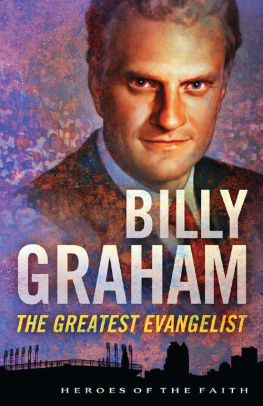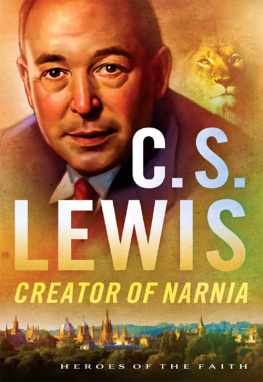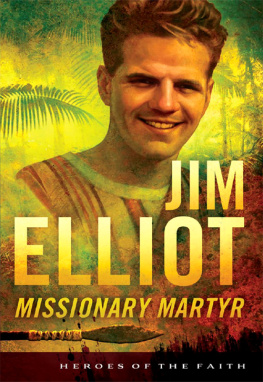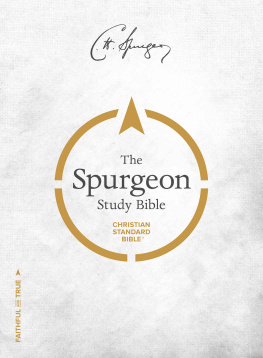
1997 by Barbour Publishing, Inc.
Print ISBN 978-1-62029-710-0
eBook Editions:
Adobe Digital Edition (.epub) 978-1-62416-054-7
Kindle and MobiPocket Edition (.prc) 978-1-62416-053-0
All rights reserved. No part of this publication may be reproduced or transmitted for commercial purposes, except for brief quotations in printed reviews, without written permission of the publisher.
Churches and other noncommercial interests may reproduce portions of this book without the express written permission of Barbour Publishing, provided that the text does not exceed 500 words and that the text is not material quoted from another publisher. When reproducing text from this book, include the following credit line: From Charles Spurgeon, published by Barbour Publishing, Inc. Used by permission.
All scripture quotations, unless otherwise noted, are taken from the King James Version of the Bible.
Cover illustration: Greg Copeland
Cover design: Kirk DouPonce
Published by Barbour Publishing, Inc., P.O. Box 719, Uhrichsville, Ohio 44683, www.barbourbooks.com
Our mission is to publish and distribute inspirational products offering exceptional value and biblical encouragement to the masses.

Printed in the United States of America.
FOREWORD
Born and raised in England, Charles Haddon Spurgeon was one of the most influential Baptist ministers of his day. During his lifetime, he introduced thousands of people from all walks of life to the Lord through his preaching. Although he had little formal education, Spurgeons life and works impacted lives on both sides of the Atlantic.
Charles H. Spurgeon was undoubtedly a man for his time. What would he do in these days? We do not know. But if he were here, God would no doubt find him ready to respond to His will, regardless of the demand.
Those who knew Spurgeon personally bear a wonderful testimony to his life, character, and work. Spurgeon not only influenced those around him but also seemed to fashion them after his own model. They were, at least in spirit, all similar, all following their pastor, leader, and friend. Their characteristics were faithfulness to the Truth, love for the souls of men and women, independence in thought and action, and a deep love for the Savior. The spirit of Spurgeon long hovered over all the spheres of his work in Londonat the New Park Street Tabernacle, orphanage, college, colportage, and almshouses.
Spurgeon was a powerful witness to and expositor of the Bible. His contributions to evangelical thought can never be obliterated. The doctrines of grace were his meat and drink. The Savior was a living personality to him constantly.
Spurgeon was a theologian of the first order and, as a preacher, a master of homiletics. His literary knowledge was extensive. He possessed a great mind. Through declining titles, he was able to touch all classes and conditions of humanity. Leading politicians, scientists, military officers, students, and clergymen of all denominations were among his audiences. He was fully convinced of the truths he taught and always could give scriptural reasons for his beliefs. The Bible was his message, armory, confidence, and argument. He preached the eternal election of humans to everlasting life, but he equally stressed human accountability to God. He never hesitated to proclaim truths he could not fully reconcile in his own mind, if they were in Gods Word.
GRACE WAS ONE OF SPURGEONS FAVORITE TOPICS .
Grace was one of Spurgeons favorite topics. His kindheartedness and generosity were what most impressed many of those who knew him, and he instilled these characteristics in others. Numerous ministers and missionaries were started on their careers by financial assistance from Spurgeon.
The Holy Spirit made him a great soul winner. Many people abroad attributed their conversions to Spurgeons ministry. Truly, God made His minister a flame of fire.
Spurgeon was not only a great preacher but a pastor whose spiritual influence was great among his flock. When asked why he was so phenomenally successful, he frequently would reply, My people pray for me. And what prayer meetings they had in those days! Hundreds gathered on Monday evenings at his church. Those and smaller prayer groups continued long after his death.
Indeed, Spurgeon was never out of touch with his Lord. A friend recalled a train trip with Spurgeon and several others when, in the midst of their jovial conversation, Spurgeon suddenly said, Brethren, I have just remembered something. Let us pray about it together. He related the need and, for the next few minutes, led them in prayer. At a deacons meeting, a great need in one of the branches of the ministry was being discussed. Prayer was suggested. But Spurgeon interrupted, took a sheet of paper, wrote C. H. Spurgeon, fifty pounds, and passed it around for the others to add their names and amounts. Now, brethren, he said, we can conscientiously pray.
Such was the man who was empowered to do a work that even today points to Gods faithfulness and the power of His gospel, reaching the uttermost parts of the earth.
This biography of Charles H. Spurgeon was written by J. C. Carlile, and edited and abridged by Dan Harmon.
1
MEASURING SPURGEON
Londoners love pageants. They turn out from every direction for a great occasion. Coronations and other celebrations attract hundreds of thousands of spectators, but Londons greatest crowds gather for funerals in the time-honored English tradition of paying homage to the departed. When Wellingtons body was carried through the streets, there was hardly standing space along the route.
February 8, 1892, saw London honor a man without a title or even an academic degree. He had no political reputation, no aristocratic connections. The funeral procession, more than two miles long, included men and women of all social classes and economic conditions. The simple olive casket at the head was carried amid palm branches and flowers. Newspapers reported that more than one hundred thousand people participated in the memorial services, and practically all London suspended activities in respect for the deceased.
What are they waiting for? asked a stranger, looking at the packed thousands standing at the entrance to Norwood Cemetery.
Dont you know? Its Spurgeons funeral, said a woman in a whisper.
Spurgeon? You mean the preacher at the tabernacle? Well, I never thought London cared so much about any preacher.
At the close of a sermon on December 27, 1874, C. H. Spurgeon had remarked with uncanny insight:
In a little while there will be a concourse of persons in the streets. Methinks I hear someone inquiring, What are all these people waiting for?
Do you not know he who is to be buried today?
And who is that?
It is Spurgeon.
What? The man that preached at the tabernacle?
Yes, he is to be buried today.
That will happen very soon, and when you see my coffin carried to the silent grave, I would like every one of you, whether converted or not, to be constrained to say, He did earnestly urge us in plain and simple language not to put off consideration of eternal things. He did entreat us to look at Christ. Now he is gone. Our blood is not at his door if we perish.
SPURGEON WAS FAR-SEEING, WITH THE GIFT OF SEEING THE UNSEEN .

